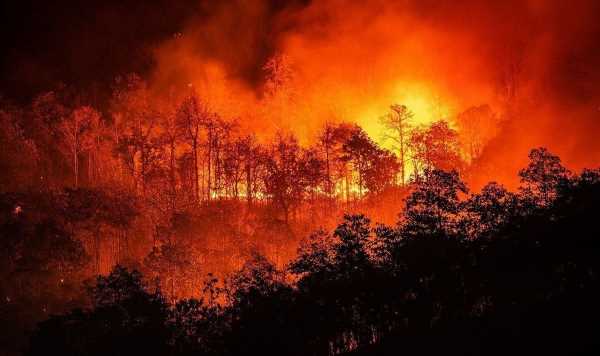
Prince Charles says tackling climate change is 'utterly essential'
We use your sign-up to provide content in ways you’ve consented to and to improve our understanding of you. This may include adverts from us and 3rd parties based on our understanding. You can unsubscribe at any time. More info
The climate emergency has put planet Earth in a “code red” situation that calls for urgent mitigation measures. This is the latest warning of Oregon State University ecologist Professor William Ripple and his colleagues, who write: “Humanity is unequivocally facing a climate emergency. The scale of untold human suffering, already immense, is rapidly growing with the escalating number of climate-related disasters. Therefore, we urge scientists, citizens and world leaders to quickly take the necessary actions to avoid the worst effects of climate change.”
The exhortion comes this year, the 30th anniversary of the “World Scientists’ Warning to Humanity” — a 1992 document penned by the American particle physicist Henry Way Kendall, and signed by around 1,700 leading scientists.
Prof Kendall and his peers cautioned that “human beings and the natural world are on a collision course.”
In 2017, Prof. Ripple authored a follow-up — “World Scientists’ Warning to Humanity: A Second Notice” — which holds the record for the journal paper with the largest number of co-signing scientists and formal supporters at 15.364 experts.
Recommending measures to limit population growth and curb the consumption of meat, fossil fuels and other resources, with data showing how most of the key environmental issues flagged in the 1992 warning are continuing to get worse, with no change in pace.


This was followed by the first “Warning on Climate Change” in 2019, signed by more than 11.000 scientists, which called for “bold and drastic transformations” regarding economic and population growth — both identified as key drivers of carbon dioxide emissions — in order “to secure a sustainable future”.
The previous update to this warning, issued last year, pointed to six areas where fundamental changes in the way we live are needed to avert climate disaster.
These included the elimination of fossil fuels and the shift to renewable sources of energy, slashing short-living air pollutants, and restoring and protecting Earth’s natural ecosystems.
Other recommendations involved reducing food waste and switching to plant-based diets, moving to a circular and ecological economy that minimises overconsumption by the wealthy and factors in the full environmental impacts of goods and services, and working to stabilise and then reduce the global population by means of education and reproductive rights.


Prof. Ripple and his colleagues said that since the original warning in 1992, there has been around a whopping 40 percent increase in the rate of global greenhouse gas emissions.
They added: “This is despite numerous written warnings from the Intergovernmental Panel on Climate Change and a recent scientists’ warning of a climate emergency with nearly 15,000 signatories from 158 countries .
“Current policies are taking the planet to around 3 degrees Celsius warming by 2100, a temperature level that Earth has not experienced over the past 3 million years
“The consequences of global heating are becoming increasingly extreme, and outcomes such as global societal collapse are plausible and dangerously underexplored.”
DON’T MISS:
Heat pump scheme torn apart as Rishi urged to scrap ‘immoral waste’ [ANALYSIS]
Putin poised to spark energy horror in UK as Russia plots sabotage [INSIGHT]
UK urged to exploit geothermal energy potential ‘without delay’ [REPORT]
In their most recent warning, the researchers highlight a number of areas of concern, from the increase in climate-related weather extremes to alarming shifts in so-called planetary vital signs, from the loss in global tree cover to the melting of the ice sheets.
Regarding the former, the team said: “Climate change has increased the frequency and intensity of severe weather events across the world.
“This is likely because of a variety of interconnected processes, including an overall warming trend, changing precipitation patterns, rising sea levels and changes in the jet streams.
“For example, rapid Arctic warming may have made the summer jet stream in the northern hemisphere more prone to meandering and becoming blocked, causing heat waves, flooding, droughts, and other disasters.
“We are now regularly seeing events and disasters that previously occurred only rarely.
Prof. Ripple and his colleagues continued “Tragically, these disasters disproportionately harm poor people in low-income regions that have had minimal contributions to the buildup of greenhouse gases.
“For example, in the summer of 2022, one third of Pakistan was flooded, displacing 33 million people and affecting 16 million children.
Other disasters this year include terrifying wildfires in Europe, back-to-back cyclones and subsequent flooding in eastern Australia, numerous rivers drying up in China and Europe, [and] an extraordinarily intense hurricane striking the Southeastern United States/
There has also, they added, been “powerful storms and extensive flooding in Bangladesh and India, megafires and a continuation of the decadal drought in the western United States, a massive flood that closed Yellowstone National Park, and unusually severe heat waves or ‘heat domes’ in many parts of the northern hemisphere.”

The researchers concluded: “There is more at stake today than at any time since the advent of the stable climate system that has supported us for more than 10,000 years.
“Here we stand at the precipice, with the opportunity to make such an immense difference for life on Earth.
“The very future of humanity depends on the creativity, moral fibre, and perseverance of the 8 billion of us on the planet now.
“Rather than lose hope, we must equitably reduce ecological overshoot and immediately pursue massive-scale climate change mitigation and adaptation.
“This is the only way we can limit the near-term damage, preserve nature, avoid untold human suffering, and give future generations the opportunities they deserve.”
The full findings of the study were published in the journal BioScience.
Source: Read Full Article